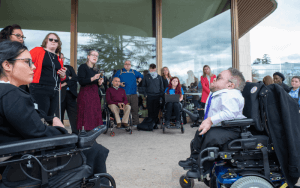Ministers are to test a new approach to dealing with claimants who breach strict benefit conditions for the first time, in the latest sign that the government is finally listening to calls to soften its much-criticised sanctions regime.
The Department for Work and Pensions (DWP) has agreed to trial handing out warnings instead of benefit sanctions when a claimant breaches the conditions imposed on them for the first time.
It is one of five recommendations made in February’s report by the public accounts committee (PAC) on benefits sanctions, all of which have been accepted by ministers, according to a document sent by the Treasury to the committee earlier this month.
It is the latest sign that years of campaigning by disabled activists and anti-austerity protesters aimed at raising awareness of the harshness of the sanctions regime might finally be paying off.
The decision to agree all five of the report’s recommendations comes only weeks after the UN’s committee on the rights of persons with disabilities made sweeping criticisms of the UK government’s welfare reforms.
The UN committee called on the government to review “the conditionality and sanction regimes” linked to employment and support allowance, and “tackle the negative consequences on the mental health and situation” of disabled people.
Two weeks ago, Mordaunt said her department would shortly be making an announcement on the conditionality and sanctions regime as it affects people with mental health conditions.
And the new work and pensions secretary, David Gauke, admitted at his party’s annual conference earlier this month that the system of benefit sanctions often fails to work and can instead cause harm to claimants, particularly those with mental health conditions.
He promised then to try to find a way to make the sanctions system less damaging to people with mental health conditions.
The Treasury document says ministers have also agreed to monitor variations in the number of sanctions imposed by different jobcentres, after PAC warned that the department had “not analysed why some jobcentres use sanctions so much more than others”.
The report also warned that DWP failed to monitor how often “vulnerable” claimants – many of whom are disabled – receive the protection from the sanctions system that they should be given.
DWP said that it was not currently possible to “extract” data on how often these protections for vulnerable claimants were used, but that it would “explore the feasibility of building such capability” and report on progress in January.
Among the victims of the sanctions regime was David Clapson (pictured), who had diabetes, and died in July 2013 as a result of an acute lack of insulin, three weeks after having his jobseeker’s allowance sanctioned.
Because he had no money, he couldn’t afford to pay for electricity that would have kept the fridge where he kept his insulin working, in the height of summer, and he had also run out of food.
An autopsy held after his death found his stomach was empty, and the only food left in his flat in Stevenage was six tea bags, a tin of soup and an out-of-date can of sardines. He had just £3.44 left in his bank account.
But despite the circumstances of his death, and clear links with the sanctions system, no inquest was ever held, even though DWP admitted that it knew he was insulin-dependent.
PAC’s February report said that sanctions can often be imposed for honest mistakes, and that about a quarter of people on jobseeker’s allowance between 2010 and 2015 had at least one sanction imposed on them.
Suspending people’s benefits can lead to rent arrears and homelessness, the report added.
DWP has also agreed to try to improve its data systems to help it understand the impact of sanctions on claimants’ job prospects.
And it has promised to work with other government departments and local authorities to understand how sanctions affect the use of other services, such as foodbanks or debt advice charities.
It will also continue to monitor concerns raised by the committee that claimants who have been sanctioned are having their housing benefit stopped by mistake.
Anita Bellows, a researcher with Disabled People Against Cuts, said: “If there is any reason to be optimistic, it is because the narrative has changed through pressure and activism and there is now a public recognition that sanctions can be counter-productive and even harmful.”
She said ministers should stop all sanctions “while trying to understand their negative impact on claimants, but the government would never do that”.
She said that more information about how the system is working “can only be useful”, but she added: “However, some recommendations like a trial of warnings will be only implemented based on their feasibility and a change of legislation; others, like the improvement of data systems and better information on sanctions, were recommendations already made by the National Audit Office and UK Statistics Authority which had not been acted upon by DWP.”
She said it would be useful to know the reasons for the “huge variations” in sanctions between jobcentres, and how often DWP uses the protection for vulnerable claimants, even though “these protections are very limited and can never prevent a sanction”.
But she said the impact of the work the government has now agreed to carry out would “also depend on DWP willingness to look at the wider picture and consider the harm sanctions can do to individuals outside work parameters like earnings and the real costs born by other services once claimants are deprived of their income.”
Ken Butler, welfare rights adviser for Disability Rights UK, welcomed the government’s decision to accept all the committee’s recommendations, but he said that “without contesting the committee’s findings it is difficult to see how it could do anything else.
“At heart, what is needed is not ‘monitoring’ but the end of the use of sanctions.
“An earlier National Audit Office report highlighted that there is no evidence that sanctions are effective in incentivising disabled people to move into work.
“Impacts include losing vital income, disabled people – and their families – going without essentials, having to use foodbanks, depression and more.
“Benefit sanctions are not only harmful but in some cases even potentially lethal – with the tragic case of David Clapson being an example.
“Given the extra costs that disabled people already face in their day-to-day lives, sanctions are especially punitive.
“Disability Rights UK wants a system that genuinely supports the many disabled people who want to work to keep their job when they become disabled – and, for those out of work, to get into work, or set up their own business, with the tailored and flexible support they need to do so.
“Instead, people are subject to a regime that seems to be finding coercive ways to get people off benefits when their health or other critical factors clearly make this inappropriate.”
Asked if DWP’s decision to accept all five PAC recommendations, and other recent ministerial announcements, showed it was finally listening to criticism of the sanctions regime, a DWP spokesman said: “Sanctions are only used in a very small percentage of cases when people fail to meet their commitments without good cause.
“As with any part of our welfare system, we do regularly review policies to ensure they are suitable and conduct trials.
“Yes, we’re considering the feasibility of a trial of warnings and that’s public knowledge.
“As with the other PAC recommendations, we will report on progress relating to this trial in January 2018.”

 UN’s ‘damning verdict’ is ‘vindication’ of fightback against government’s rights violations
UN’s ‘damning verdict’ is ‘vindication’ of fightback against government’s rights violations Direct action ‘will put stake through the heart’ of government scapegoating of disabled people
Direct action ‘will put stake through the heart’ of government scapegoating of disabled people DWP claims it has no written evidence to show why it weakened suicide probe guidance
DWP claims it has no written evidence to show why it weakened suicide probe guidance